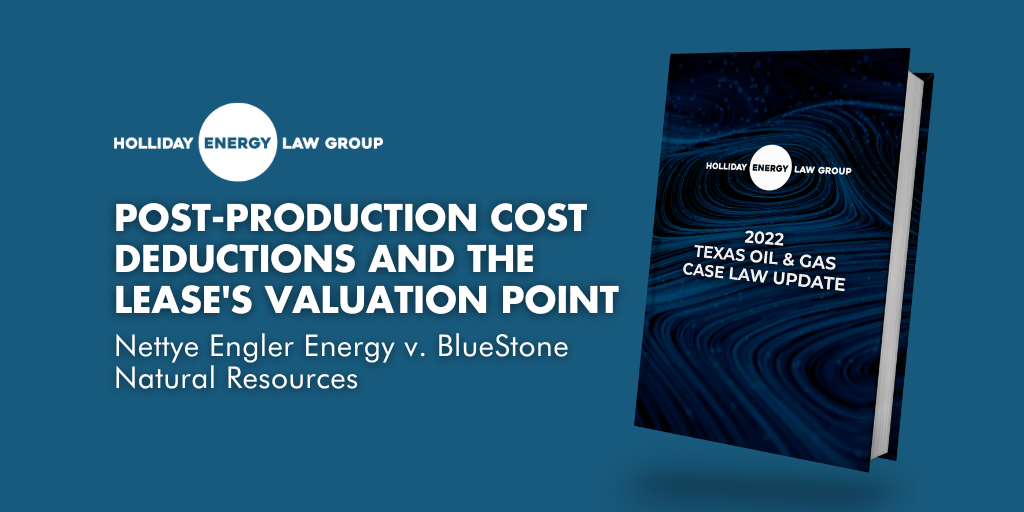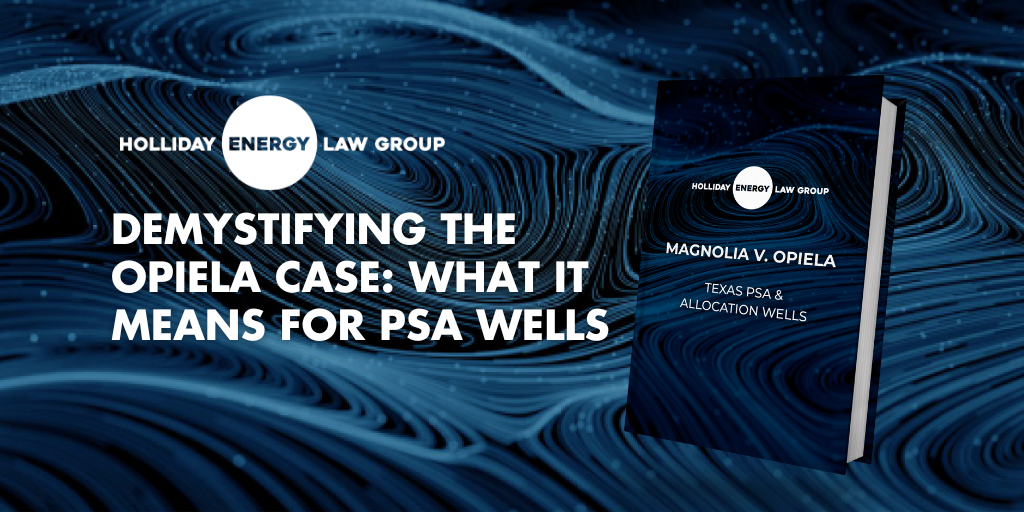Texas Fourth Court Addresses Post-Production Costs
.png)
EnerVest Operating, LLC v. Mayfield, No. 04-21-00337, WL 4492785 (Tex. App.—San Antonio, Sep. 28, 2022).
Deduction of Fuel Gas from Total Royalties Owed to Lessor.
In EnerVest Operating, LLC v. Mayfield, the Fourth Court of Appeals held that per the subject oil and gas leases, deductions from royalties were proper when attributed to post-production costs, reversing the lower court’s decision. Accordingly, the Court analyzed whether fuel gas was a properly deducted post-production cost from the lessors’ total royalties under the specific language of the leases at issue. The appellate court concluded royalty deductions for fuel gas use in this instance were proper.
Key Takeaways
- Gas royalties are subject to deductions attributed to post-production costs if the lease royalty provision calculates payment based on “market price at the mouth of the well.”
- In the case of an unambiguous instrument, lessors cannot rely on the conduct of predecessor lessees (e.g., who did not take fuel gas deductions from royalties) to bind current lessees to the same practice.
- Precedent for classification of fuel gas as a post-production cost.
- Always, always, always read your lease to ensure that the lease terms do not alter common law principles.
Origin of the Dispute
This is a dispute about whether the lessee owes the lessor royalty for the use of fuel gas under the terms of two identical oil and gas leases. EnerVest Operating, LLC (“EnerVest”) is the lessee, Stanley B. Mayfield and Gerry Ingham (“Lessors”) are the lessors.
The gas royalty provision at issue contained a “market value at the mouth of the well” valuation point:
The royalties to be paid by lessee are . . . on gas, including casinghead gas and all gaseous substances, produced from said land and sold or used off the premises or in the manufacture of gasoline or other product therefrom, the market value at the mouth of the well of one-eighth of the gas so sold or used, provided that on gas sold at the wells the royalty shall be one-eighth of the amount realized from such sale[.] (emphasis added).
In addition, the lease included the following free-use provision:
Lessee shall have free use of oil, gas, and water from said land, except water from lessor's wells and tanks, for all drilling operations hereunder, and the royalty shall be computed after deducting any so used. (emphasis added).
EnerVest operated gas wells on the leases in several sections of Sutton County. In operating the leases, EnerVest utilized two batteries, one of which was located off the leased premises. To move the gas downstream, EnerVest was required to compress and dehydrate the product to meet processing specifications; a portion of the produced gas – a.k.a. fuel gas – was utilized to power these compressors and dehydrators.
Despite the prior operator paying royalties on fuel gas, post-acquisition, EnerVest ceased paying royalties on its fuel gas usage. Lessors sued, claiming the deduction of fuel gas from the royalty calculation amounted to an impermissible post-production cost deduction.
At trial court, Lessors argued EnerVest’s failure to pay royalties on the fuel gas used to compress and dehydrate the gas was a breach of the royalty provisions. More specifically, the Lessors argued that EnerVest improperly deducted the fuel gas volumes from those volumes on which royalties were paid (i.e., they paid royalties on a smaller amount of gas than they should have). This deduction of fuel gas, they continued, was an improper post-production cost that was assessed against the Lessors’ share of royalty, where the lease (under their interpretation) did not allow for the deduction of post-production costs. Under the free use provision, they argued, the operator was only allowed the free use of gas in drilling operations on the leased premises (see specific language), but not in operations to move produced gas to market.
EnerVest disagreed, arguing that the leases’ “mouth of the well” valuation point required Lessors to bear their fair share of post-production costs (i.e., those costs incurred beyond the mouth of the well). Because the Lessors were required to bear their proportionate share of post-production costs, and because deducting the amount of fuel gas used from the total volume of gas upon which royalties are paid is a post-production cost, EnerVest argued that it was authorized to pay royalties on produced volumes less amounts used as fuel gas.
The trial court found the free-use clause restricted EnerVest’s free use of gas to leased premises only, and ordered they reimburse Plaintiffs for all fuel gas deductions. EnerVest appealed.
Gas Royalty
On the issue of whether EnerVest properly deducted fuel gas, the Court of Appeals analyzed the parties’ conflicting interpretations of the gas royalty and free-use provisions. Next, the court considered Lessors’ evidence that the prior lessee paid royalties on fuel gas and whether this past action bound EnerVest to do the same.
- Market Value at the Well
The court began with an excellent overview of the general rules around post-production cost deduction:
- Royalty payments are the lessor’s fractional share of production from a lease, and they may be calculated at the wellhead or at any downstream point.
- Royalties are free of production expenses (i.e., the costs to get the hydrocarbons out of the ground), but subject to post-production costs such as taxes, treatment, and transportation costs (i.e., the costs to move the product from the wellhead to the point of sale, as well as costs to make the product marketable).
- Parties are free to modify the general rules as they see fit.
- Royalty valuation “at the mouth of the well” requires the royalty holder to share in post-production costs. This is because the hydrocarbons at the well are relatively raw and not located in a place that they could be sold to the end user. As a result, they are lower in value than the same hydrocarbons that have been treated and transported to the place of sale, where they are now more valuable. The higher sales price on which the lessor’s royalty is based must then be adjusted downward to account for the additional costs borne by the operator. This adjustment is made by subtracting the costs of moving the product to market from the sales price obtained at the market.
The court began its analysis by pointing out that the gas royalty provision at issue clearly states that royalty interests are calculated based on the “market value at the well.” According to the court, “market value at the well” is a commonly utilized and accepted oil and gas lease term, which has been construed to mean that “the market value is calculated by subtracting [post-production costs] from sales proceeds.”
That is, in order to value the royalties at the well in those circumstances where the actual sale takes place in a different location, after the product has been treated and transported, the sales price has to be adjusted. That adjustment means deducting the costs of bringing the gas to market (i.e., assessing post-production costs).
Because the parties chose an “at the well” valuation point, which is a term of art with a defined meaning, the court determined that it was proper for EnerVest to deduct post-production costs from the actual sales price to determine the market value of the gas “at the mouth of the well.”
2. Fuel Gas as a Post-Production Cost
The court next analyzed whether fuel gas qualified as a post-production cost.
Generally, post-production costs are those costs expended to make the product more valuable, including processing, compressing, transporting, and other costs expended to prepare the gas for sale at a downstream location. Specific to fuel gas, the court looked for guidance from the U.S. Fifth Circuit in Piney Woods Country Life School v. Shell Oil Co., which held fuel gas was a post-production cost because it contributes to the material enhancement of the gas’ value, and as such, no royalty was owed on it. Based on this precedent, the Court determined that EnerVest rightfully deducted royalties on fuel gas, having been authorized to subtract post-production costs from Appellee’s interests under the market value at the well valuation point.
3. The Effect of the Free-Use Provision
Appellees argued that the free-use provision in this case limited the free use of gas only to gas used in drilling operations on the premises; as such, royalty was owed for any other gas used by the operator. In taking this position, Lessors relied on BlueStone Natural Resources II, LLC v. Randle, from the Texas Supreme Court, in which a similar free-use clause was used to limit deductions to activities within the leased premises. The court disagreed, holding that Bluestone was inapplicable to this case because the Bluestone royalty provision did not specify a market value at the mouth of the well calculation. Therefore, Appellee’s assertion amounted to “an isolated reading of the free-use clause and ignores the plain language in the gas royalty provision, which requires the determination of gas royalty by market value at the mouth of the well.” That is, under a four-corners analysis, the court in EnerVest determined that the parties clearly provided for an “at the well” valuation point, which would be obviated if the free-use clause were to be so narrowly construed as suggested by the Lessors.
Restated, the subject lease here required deduction of post-production costs when calculating royalties, while the Bluestone lease did not. Accordingly, the Court held the free-use provision did not usurp the gas royalty provisions, and Appellees rightfully carried their share of post-production costs.
4. Past Actions of Predecessors-in-Interest
In their last argument, Lessors claimed EnerVest’s predecessors-in-interest paid royalty on fuel gas under the same provisions in dispute. The court rejected Lessors’ argument, holding that such a ruling would require them to interpret the leases at issue based on past conduct, which would alter the plain language of the unambiguous leases. Because the leases at issue were unambiguous, a court’s review is limited to the intent of the parties as expressed in the four-corners of the document. In the face of an unambiguous lease, past conduct or promises did not give rise to estoppel and past conduct of parties was not relevant to their interpretation of the express terms of the subject leases.
Holding
The Court of Appeals reversed and remanded the case, holding EnerVest did not owe Appellees reimbursement for royalties on fuel gas. Because the gas royalty provision expressly stated the method of calculation in determining the lessor’s royalty payment, the deduction of post-production costs, specifically fuel gas, was correctly applied against total royalties owed based on “market value at the mouth of the well."
For a more detailed insight into the 2022 Texas Oil & Gas Case Law Update, download the HELG paper.


